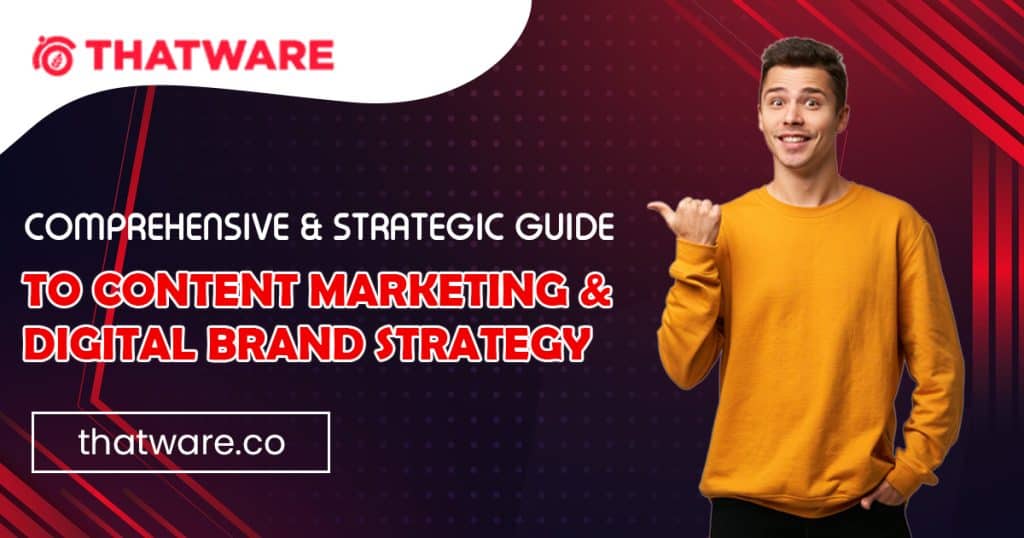SUPERCHARGE YOUR ONLINE VISIBILITY! CONTACT US AND LET’S ACHIEVE EXCELLENCE TOGETHER!
Content marketing is a cornerstone of digital marketing, employing an inbound approach to captivate, educate, and expand a specific audience. Through the creation and dissemination of valuable, educational, entertaining, or informative content, businesses aim to establish credibility, foster connections, and ultimately drive customer engagement and loyalty. This strategy focuses on providing content that addresses the needs, interests, and pain points of the target audience, rather than pushing promotional messages. By delivering relevant and valuable content across various channels such as blogs, social media, videos, and podcasts, content marketing aims to attract and retain a dedicated following while nurturing leads through the buyer’s journey. Overall, content marketing serves as a powerful tool for building brand awareness, fostering trust, and driving sustainable growth in the digital landscape.

Why Content Marketing?
Content serves as the most potent tool for delivering value to audiences in a timely and relevant manner. By providing useful, informative, and pertinent information, content meets the needs and interests of the audience precisely when they seek it. Whether through blog posts, social media updates, videos, or other formats, content has the flexibility to address diverse topics and cater to various preferences. Its effectiveness lies in its ability to not only educate and entertain but also to establish credibility and trust with the audience. By staying current with trends and addressing timely topics, content remains highly relevant, ensuring it resonates with audiences and captures their attention. Ultimately, being useful, relevant, informative, and timely positions content as a cornerstone of effective communication and engagement in today’s fast-paced digital landscape.
SOME CONTENT MARKETING STATS
#90% of marketers using content marketing plan to continue investing the same amount in the channel in 2022.
#79% of companies use content marketing to generate quality leads.
#46% of businesses reported they want to increase their content creation spending in 2022.
There are currently more than 600 million blogs as of 2021.
3 out of 4 B2C marketers believe their content marketing is successful.
HOW AI IS ENHANCING THE GAME OF CONTENT MARKETING
Artificial intelligence (AI) is poised to revolutionize content marketing by transforming the way existing content is enhanced and optimized. Rather than solely focusing on AI-generated content, the emphasis is on leveraging AI technologies to augment and refine the quality, relevance, and effectiveness of already created content. AI tools can analyze vast amounts of data to uncover insights about audience preferences, behavior patterns, and content performance metrics.
This information enables marketers to personalize content, tailor messaging, and optimize distribution channels for maximum impact. Additionally, AI-powered natural language processing (NLP) algorithms can enhance the semantic relevance of content by identifying and incorporating relevant keywords, entities, and sentiments. Through AI-driven content enhancement, marketers can streamline content creation processes, improve engagement metrics, and ultimately deliver more compelling and valuable content experiences to their target audiences.
DEVELOP ADVANCE CONTENT STRATEGY
Artificial intelligence (AI) presents a valuable tool for content marketers looking to optimize their strategies at every stage of the marketing funnel. By harnessing AI-powered analytics and predictive modeling, marketers can gain deeper insights into their target audience’s preferences, behaviors, and needs. This data enables the creation of highly relevant and personalized content tailored to each stage of the customer journey.
From awareness-building blog posts to consideration-focused case studies and decision-driving product demonstrations, AI can assist in crafting content that resonates with audiences throughout their buying process. Moreover, AI-powered content optimization tools can refine distribution strategies, identify high-performing content formats, and even automate content production processes, allowing marketers to focus their efforts where they will have the most significant impact. Overall, AI empowers content marketers to enhance the effectiveness of their strategies, drive engagement, and ultimately, achieve greater success in reaching and converting their target audience.
Enhanced and Advanced competitor analysis
Artificial intelligence (AI) is instrumental in not only identifying relevant competitors but also in discerning key performance indicators (KPIs) for comparison. Through advanced data analytics and machine learning algorithms, AI can systematically analyze vast amounts of data to pinpoint competitors operating within similar markets or targeting comparable audience segments. Additionally, AI can identify and prioritize the most relevant KPIs for benchmarking purposes, such as website traffic, social media engagement, conversion rates, and customer satisfaction metrics. By leveraging AI-driven competitive intelligence tools, businesses can gain actionable insights into their competitive landscape, understand market dynamics, and make informed strategic decisions to stay ahead in the industry.
FACILITATES RESEARCH AND DEVELOPMENT
With the integration of AI, content marketers can shift their focus from time-consuming research and analysis tasks to the more creative and strategic aspects of content creation, such as writing compelling context. AI tools can swiftly sift through vast amounts of data, extract relevant insights, and generate actionable recommendations, freeing up marketers from tedious manual tasks. By automating processes like keyword research, content topic ideation, and audience analysis, AI streamlines the content creation workflow, allowing marketers to allocate more time and energy to crafting engaging narratives, developing unique perspectives, and honing their brand voice. This shift enables marketers to produce higher-quality content that resonates deeply with their audience, fosters meaningful connections, and drives desired outcomes, ultimately leading to more effective content marketing campaigns.
HELPS IN CONTENT IDEATION
Artificial intelligence (AI) offers invaluable assistance in content ideation, especially in a landscape saturated with millions of existing pieces. AI-driven tools can analyze vast amounts of data from various sources, including social media trends, search engine queries, and industry news, to uncover emerging topics, keywords, and themes. By leveraging machine learning algorithms, AI can identify gaps in the market, highlight areas of interest to the target audience, and predict content topics likely to resonate. Furthermore, AI-powered content generation platforms can generate insights and suggestions based on historical performance data, audience engagement metrics, and competitor analysis, guiding marketers in crafting content ideas that are both relevant and impactful. Ultimately, AI streamlines the content ideation process, providing marketers with valuable insights and inspiration to create compelling and timely content that stands out in a crowded digital landscape.
BETTER CONTENT PERSONALIZATION
To achieve high rankings in search engines, quality content is undoubtedly essential, but it’s not the sole factor. While well-crafted content forms the foundation, meeting the specific needs and interests of the target audience is equally crucial. This entails delivering content that not only informs but also addresses the unique concerns, questions, and desires of users. Tailoring content to cater to these individual preferences enhances its relevance and engagement potential, making it more likely to attract and retain the attention of search engine users. By understanding the audience’s search intent and delivering informative, tailored content that directly addresses their queries, marketers can improve their chances of ranking well in search engine results pages (SERPs) and ultimately drive organic traffic to their websites. In essence, the combination of quality content and personalized relevance forms the winning formula for success in search engine optimization (SEO).
ADVANTAGES OF CONTENT MARKETING
BOOSTS YOUR SEO
Marketers across brands prioritise content marketing for SEO ranking. Consider this: it makes sense. When was the last time you searched for something online, whether it was business information or hotel reviews, without using Google?
39% BELIEVE THAT CONTENT MARKETING IN SEO RANKINGS IS CRUCIAL.
INCREASE BRAND AWARENESS
Content marketing is the most important parameter for achieving your brand goals in the long term.
Of all marketers, 72% report that content marketing increases customer engagement.
DIGITAL BRAND STRATEGY
Brands will find it extremely difficult to grow their business without a digital presence.
#The Internet has greatly influenced marketing and branding. The very nature of the customer-company relationship has shifted.
#For several years, digital branding has been on the rise.
#With so much at stake for businesses on the Internet, companies must learn to adapt to new ways of doing business to succeed in this dynamic business environment.
THE POWER OF DIGITAL BRANDING
- 94% of customers are likely to show loyalty to a brand that offers complete transparency.
- 59% of shoppers prefer to buy new products from the brands they trust.
- 13% of consumers would pay 31-50% more for your products or services if they were under the impression that your business is making a positive impact on the world.
# 94% of the world’s population recognizes the Coca-Cola logo.
#86% of consumers prefer an authentic and honest brand personality on social networks.
#During the holiday season, 44% of US consumers give gifts purchased from brands they are loyal to.
Consistently presented brands are 3.5 times more likely to enjoy excellent brand visibility than those with an inconsistent brand presentation.
WHY DO WE NEED DIGITAL BRANDING IN 2025
Digital Branding Strategy is more crucial than ever before. Take action today to create, standardize, or optimize your digital branding strategy and stay ahead of inflation.
SEO ALGORITHMS ARE CONSTANTLY EVOLVING
- Since most businesses now market online, SEO has become an essential skill to master.
- Search engine optimization determines whether a company’s website or blog is visible to people on top of SERP.
- It’s high time we need digital branding.
76% of small business owners have upskilled in SEO, social media, and analytics.
INFLUENCER MARKETING IS BECOMING EXTREMELY POPULAR
We interact daily with the stories and posts of our favourite celebrities and influencers. So, why not leverage their extensive social media reach to generate buzz about your company?
80% of consumers complete a purchase after seeing an influencer recommend that
product on social media.
COSTS CUTTING
One important reason for the importance of Digital Branding is that it is less expensive than most other
forms of marketing and Branding.
DIGITAL BRANDING GIVES THE BEST ROI
Digital Branding is profitable because it has a high ROI (return on investment) and a larger audience scope and reaches.
An ROI of 5:1 is considered pretty good in digital marketing.
SEO marketing has an average ROI ratio of 22:1, equating to 2,200%!
RAPID EXPANSION
You can reach a whole new set of potential customers with the help of digital marketing. As a result, you can expand your business more easily. With technological advancements, you can also better target your audience and provide personalised recommendations.
It is now estimated that the digital marketing sector to grow up to 539 Billion by the end of the financial year 2024.

Thatware | Founder & CEO
Tuhin is recognized across the globe for his vision to revolutionize digital transformation industry with the help of cutting-edge technology. He won bronze for India at the Stevie Awards USA as well as winning the India Business Awards, India Technology Award, Top 100 influential tech leaders from Analytics Insights, Clutch Global Front runner in digital marketing, founder of the fastest growing company in Asia by The CEO Magazine and is a TEDx speaker and BrightonSEO speaker.


